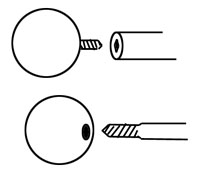External Threading: Difference between revisions
Jump to navigation
Jump to search
(Created page with "<html><div class="mw-content-ltr" dir="ltr" id="mw-content-text" lang="en"><div class="floatright"><a class="image" href="/index.php?title=File:Threading.jpg"><img alt="Threading.jpg" height="173" src="/images/f/f4/Threading.jpg" width="200"/></a></div> <p><a href="/index.php?title=Barbell" title="Barbell">Barbells</a> are attached to <a class="new" href="/index.php?title=Bead&action=edit&redlink=1" title="Bead (page does not exist)">beads</a> via threaded rods....") |
(Page conversion via llm-mediawiki-rev -jwm) |
||
| Line 1: | Line 1: | ||
[[File:Threading.jpg|right|200px]] | |||
[Barbells] are attached to [beads] via threaded rods. How they attach can vary. | |||
There are two main kinds of '''threading''' used in the [body modification] industry. The top drawing shows an internally threaded barbell, where the bead screws into the bar. The bottom drawing shows an externally threaded barbell, where the bar screws into the bead. A subtype of external threading is step-down threading, where the threaded portion is of a smaller gauge than the main stem of the barbell - this can help prevent the threads catching on the [fistula] during insertion. | |||
Latest revision as of 03:26, 17 September 2023
[Barbells] are attached to [beads] via threaded rods. How they attach can vary.
There are two main kinds of threading used in the [body modification] industry. The top drawing shows an internally threaded barbell, where the bead screws into the bar. The bottom drawing shows an externally threaded barbell, where the bar screws into the bead. A subtype of external threading is step-down threading, where the threaded portion is of a smaller gauge than the main stem of the barbell - this can help prevent the threads catching on the [fistula] during insertion.
